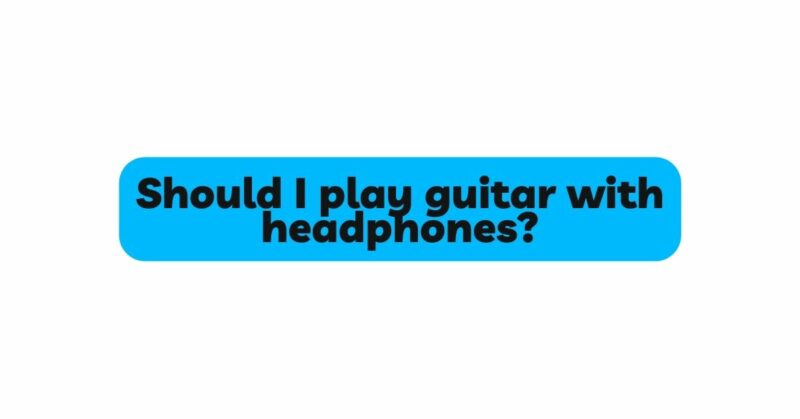Playing the guitar is a passion that transcends language and culture, allowing musicians to express themselves through beautiful melodies and soulful chords. As technology advances, guitarists have a wide array of options for practicing and performing, including the use of headphones. The question arises: should you play guitar with headphones? This article aims to explore the benefits and drawbacks of using headphones for guitar playing, helping you make an informed decision that aligns with your musical preferences, lifestyle, and goals.
- The Advantages of Playing Guitar with Headphones:
1.1. Private Practice:
One of the most significant advantages of using headphones for guitar playing is the ability to practice privately without disturbing others. This is particularly valuable for musicians who live in shared spaces or have close neighbors. Whether it’s late-night practice or early-morning sessions, headphones provide a convenient and considerate option for playing the guitar without external interference.
1.2. Enhanced Focus and Concentration:
Headphones create a more immersive and focused environment for guitar practice. By isolating yourself from external noises, distractions are minimized, allowing you to fully concentrate on your playing. The direct sound delivery to your ears enables you to dive deep into your music, leading to improved concentration, technical precision, and overall playing performance.
1.3. Improved Auditory Feedback:
Using headphones provides a direct and clear audio feedback, allowing you to hear every nuance of your guitar playing. This enhanced auditory feedback enables you to identify areas for improvement, address technical flaws, and refine your playing technique more effectively. Headphones also help in detecting tonal imbalances, string noise, and other subtleties that may not be as discernible through traditional amplifiers.
1.4. Versatility and Mobility:
Headphones offer unparalleled versatility and mobility for guitarists. They enable you to play the guitar virtually anywhere, regardless of the acoustic environment. Whether you’re on the go, traveling, or in a room with unfavorable acoustics, headphones ensure consistent and high-quality audio feedback for your guitar playing. This makes them an ideal companion for musicians who enjoy practicing or composing music on the move.
1.5. Personalized Tone and Effects:
Headphones provide a personalized and immersive audio experience, allowing you to explore different guitar tones and effects that cater to your musical preferences. Many headphones come equipped with adjustable sound profiles or built-in equalizers, enabling you to tailor the sound to your liking. This customization empowers guitarists to sculpt their ideal tone, emphasizing specific frequencies or effects, leading to a more enjoyable and immersive playing experience.
- The Benefits of Playing Guitar Without Headphones:
2.1. Connection to Instrument and Environment:
Playing the guitar without headphones provides a tactile and physical presence that is not replicated by headphones. The vibrations and resonance of the guitar interacting with the environment create a unique playing experience, making the guitar feel like an extension of your body. Many guitarists find this connection essential for their musical expression and performance.
2.2. Room Acoustics and Live Sound:
Amplifiers project sound into the room, allowing you to interact with the acoustics and ambiance of the space. The natural reverb and reflections of the room can shape the guitar’s tone, adding depth and character to your playing. This aspect is especially valuable in live performances, where the sound fills the performance space and creates a shared musical experience with the audience.
2.3. Dynamics and Expressiveness:
Traditional amplifiers offer greater dynamics, allowing you to explore a wide range of tonal possibilities. The interaction between the guitar’s volume and the amplifier’s response enables expressive playing techniques, such as volume swells, controlled feedback, and touch-sensitive dynamics. These dynamic nuances contribute to a more expressive and engaging guitar performance.
2.4. Interaction with Other Musicians:
When playing without headphones, traditional amplifiers enable better communication and interaction between musicians. The sound from the amplifier blends naturally with other instruments, fostering a cohesive musical experience. This synergy is especially important in band settings, where musicians rely on each other’s cues and musical dynamics.
2.5. Performance and Stage Presence:
In live performances, amplifiers contribute to the overall stage presence and visual impact of the band or musician. The sight of guitar amplifiers on stage adds to the iconic image of a live performance, creating a memorable and authentic concert experience for both the performer and the audience.
- Finding a Balance: A Hybrid Approach
Ultimately, the decision to play guitar with headphones or without them comes down to personal preferences, circumstances, and musical goals. Some guitarists may prefer the intimacy and focus offered by headphones for private practice and creative exploration. Others may relish the physical connection and stage presence that comes with playing through traditional amplifiers.
A hybrid approach that combines both options can offer the best of both worlds. For instance, guitarists can use headphones during private practice sessions to fine-tune their playing technique and explore various tones and effects. At the same time, they can use traditional amplifiers during rehearsals, band performances, and live shows to experience the dynamic interplay with other musicians and to connect with the audience on a more profound level.
Conclusion:
Whether you choose to play guitar with headphones or through traditional amplifiers, both options offer unique advantages that cater to different aspects of guitar playing. Headphones provide private practice, enhanced focus, personalized tones, and mobility, while traditional amplifiers offer a physical connection to the instrument, interaction with the environment, and dynamic expressiveness.
Consider your musical preferences, practice routine, and performance settings when making your decision. Embrace the flexibility and diversity of options available to you, and tailor your guitar playing experience to suit your creative vision and personal journey as a musician. Whether you’re playing unplugged or plugged-in with headphones, the joy and fulfillment of expressing yourself through the guitar remain the heart of the musical experience.


